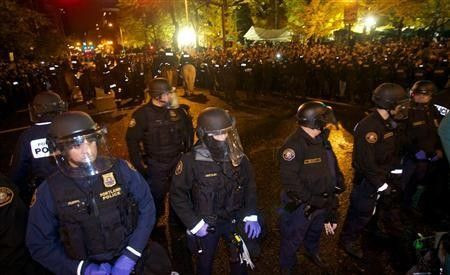Protesters Pushed to Decamp in Portland, Other Cities

Occupy Portland protesters and police confronted one another on the city's streets on Sunday, as authorities around the country try to close down encampments occupied by demonstrators for weeks.
In Portland the authorities fenced off parks the protesters had emptied out over the weekend in the face of a city-issued eviction notice.
But demonstrators regrouped in the street in the afternoon, blocking traffic in a standoff with ranks of Portland Police officers in riot gear. Police from at least one other Oregon city were reported to be reinforcing the Portland units.
Up to a thousand protesters -- with more continuing to arrive -- were in a section of street near the parks. About 15 demonstrators had been arrested, but the confrontation was generally peaceful, observers said.
Police, face-to-face with the protesters, have repeatedly told them that if they don't move out of the road, or appear to be resisting arrest, chemical agents and impact weapons -- apparently beanbag guns -- might be used and demonstrators could be subject to arrest.
On their side the protesters chanted: I don't see no riot here, take off your riot gear, The whole world is watching, and We are peaceful people.
Officials have also moved over the weekend to dismantle a protest camp in Salt Lake City, Utah, while in Denver, police on Saturday removed mattresses, cooking grills and tents illegally placed on a public sidewalk.
Seventeen people were arrested, Denver police said on Sunday.
Encampments sprang up in several cities in recent weeks in solidarity with the Occupy Wall Street movement in New York to protest what demonstrators see as economic inequality and undue influence over U.S. politics by corporate interests.
HEALTH AND SAFETY
Citing health and safety issues, some officials have urged demonstrators to take down the camps and others have used such concerns as reasons for police to force the issue.
In Philadelphia, Mayor Michael Nutter on Sunday ordered beefed-up police patrols at the city's protest site, saying conditions were dramatically deteriorating.
This movement has changed and the people have changed, he said. We are now at a critical point where we must reevaluate our entire relationship with this very changed group.
He said communication has broken down between officials and protesters, and city concerns over fire hazards, litter and a lack of toilets have gone unaddressed.
Added to that are thefts, assaults and an alleged sexual attack at the camp at Dilworth Plaza, he said in a statement.
The mayor said a $50 million makeover of Dilworth Plaza is planned and by opting not to move, Occupy Philly is now purposely standing in the way of a nearly 1,000 jobs for Philadelphians at a time of high unemployment.
In Salt Lake City authorities moved to dismantle a camp at a downtown park and arrested 15 people on Saturday.
In Oakland, California, the scene of previous clashes between police and demonstrators, city hall issued a third eviction notice on Sunday. It warned protesters they faced immediate arrest if they continued to camp out in the city's plaza and parks.
The city offered alternative emergency accommodation at two local area homeless shelters, and laid on a shuttle service to one that was not within walking distance of the encampments.
In St. Louis, Mayor Francis Slay has warned protesters they have to decamp but has offered to continue talks to find a permanent place for the protest.
The nationwide protest movement, which started in New York in September, has voiced opposition to what the demonstrators see as an unfair concentration of wealth in the United States. Among other issues, they object to corporate excesses and bailouts of major banks.
© Copyright Thomson Reuters {{Year}}. All rights reserved.





















